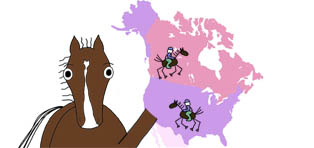June 29 2010
By Sarah Wynne Jackson
During these tough economic times when many folks have tightened their budgets and are spending less, Back Country Horsemen of America members have been donating more of their time, effort, and resources to preserving our heritage of equine use on public lands.
BCHA is proud to announce that its national volunteer value for 2009 was $7,500,000. That includes 345,700 hours of manual work; skilled labor; use of heavy equipment; hauling equipment, animals, and people to work sites; as well as Leave No Trace education and attendance at public meetings. What did BCHA members accomplish in all that time? Lots!
Making a Difference
Central Kentucky Back Country Horsemen have been working hard with the Kentucky Horse Council on the White Sulphur Horse Camp in the Daniel Boone National Forest. This primitive camp with 20 sites was started but never maintained. CKyBCH members eliminated a stagnant watering tank and laid a water line from a pond to the center of camp, providing clean, fresh water for campers’ horses. Further improvements are planned for completion in 2010.
Back Country Horsemen of Alabama and Show Me Missouri Back Country Horsemen worked together to clean up trails in the Mark Twain National Forest after an inland hurricane. Most BCH units across the country do their best to get out on the trails as soon as possible after storms to clear aside fallen trees and branches, fix washed out trails, and replace bridges that have been swept away.
Members of the Skagit and Whatcom chapters of Back Country Horsemen of Washington State worked alongside the Department of Natural Resources to complete a monumental task that was sorely needed: using GPS equipment, they mapped the 76 trails (nearly 100 miles) of the Les Hilde Trails in the Harry Osborne State Forest. To assist users until DNR is able to post permanent signs, BCHW members posted over 200 temporary signs.
In addition to trail maintenance and watching over the ecosystem, the Chloride Chapter of Back Country Horsemen of Arizona assisted large ranchers and the BLM with needs local to their area. They helped gather cattle in the very rough mountainous terrain, as well as packing in water for workers.
The lovely Spanish mustangs in the Cerbat Mountains of Arizona are still protected, and the Chloride Chapter of BCHAZ keeps an eye on them, counting the herds and tracking their condition, as well as making sure the watering holes are usable.
Back Country Horsemen of Idaho also had a busy year. The High Desert Chapter partnered with the Off Road Association and the Geocache Club in cleaning the North Rim. They filled five dumpsters with trash. They were also involved with a work project at the Porcupine Springs Campground with the U.S. Forest Service, where, in addition to regular trail maintenance, they built a horse riding loop and constructed four horse corrals for overnight camping.
The North Central Idaho Chapter conducted the U.S. Forest Service Defensive Horsemanship Training at the rodeo grounds in Grangeville, Idaho. They also sprayed unwanted weeds on the Moose Creek Ranger District and the Lochsa Ranger District in the Selway-Bitterroot Wilderness; and in the Seven Devils/Windy Saddle area, they constructed a hitch rail, cleaned up the campground, and removed hazardous trees.
Buffalo River Back Country Horsemen of Arkansas have been battling their own “right to ride” issue on Buffalo National River lands. The general management plan is scheduled to be rewritten within the next five years, and BRBCH is determined to preserve our heritage of using pack and saddle stock on public lands. At public meetings held in various area towns, they encouraged other horse users to voice their opinions to the National Park Service regarding horse use on public lands.
BRBCH also packed out a variety of scrap from an old hunters’ camp in Rae Valley. Ten horses, six volunteers, and three park employees carried out rolls of old barbed and welded wire to Elephant Head, where a Park boat floated the load away.
Your Voice for Horse Use on Public Lands
As the leading organization in saving public lands trails for equestrian use, each one of these Back Country Horsemen of America groups is happy and eager to accomplish all these tasks and more; not just for users of pack and saddle stock, but for everyone who loves wild lands as much as they do.
It’s an unfortunate truth that federal, state, and local public lands managers simply don’t have the budget to maintain the majority of the trails under their jurisdiction. That means that the burden falls on the backs of dedicated and hard working volunteers across the country such as Back Country Horsemen of America.
Another difficult reality is that more trails, properties, and whole wildernesses are being designated “No Horses.” Without a unified voice such as that of Back Country Horsemen of America, our heritage of equine use and our right to ride on public lands is in serious jeopardy.
About Back Country Horsemen of America
BCHA is a non-profit corporation made up of state organizations, affiliates, and at large members. Their efforts have brought about positive changes in regards to the use of horses and stock in the wilderness and public lands.
If you want to know more about Back Country Horsemen of America or become a member, visit their website: www.backcountryhorse.com, call 888-893-5161, or write PO Box 1367, Graham, WA 98338-1367. The future of horse use on public lands is in our hands!
Contact: Peg Greiwe
peg@backcountryhorse.com
1-888-893-5161
www.backcountryhorse.com

No comments:
Post a Comment